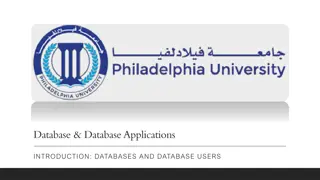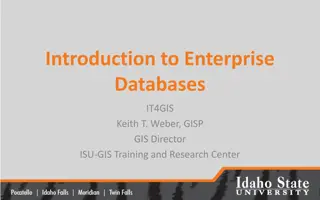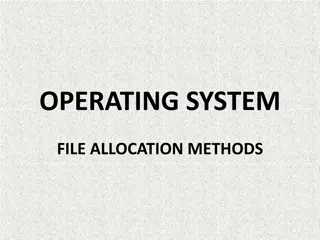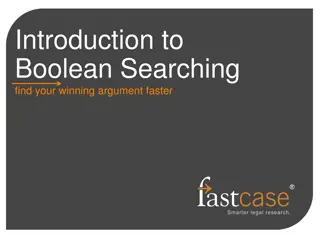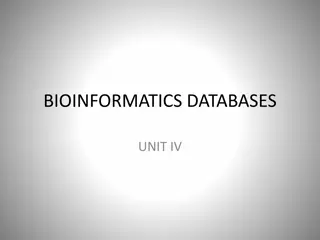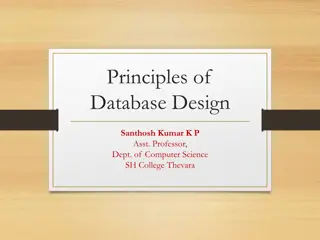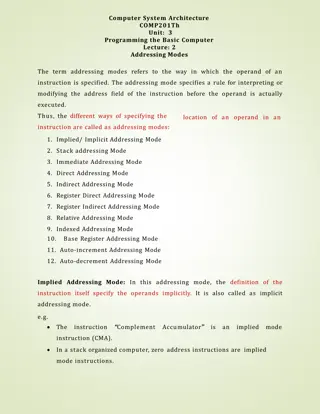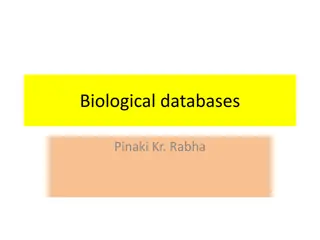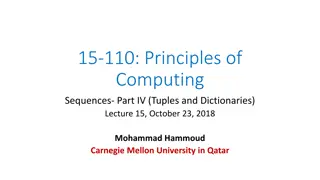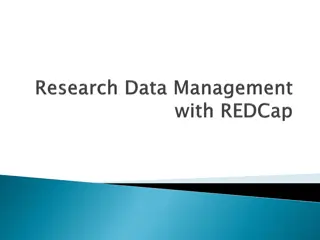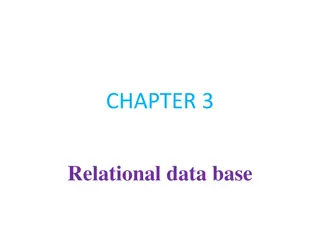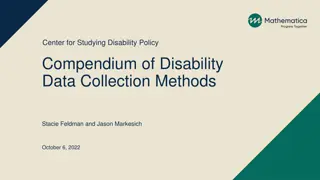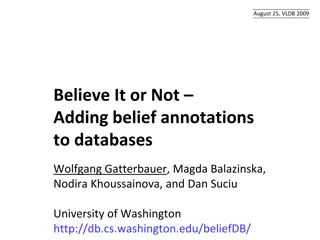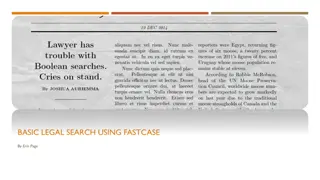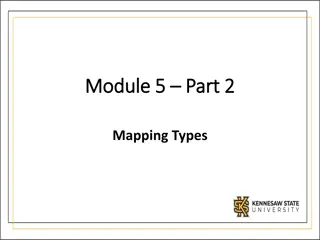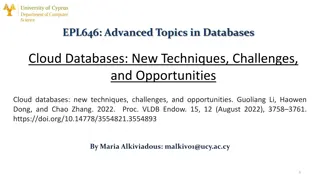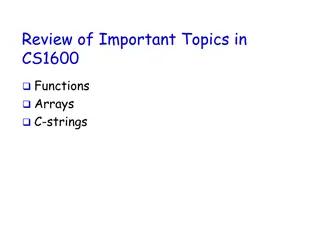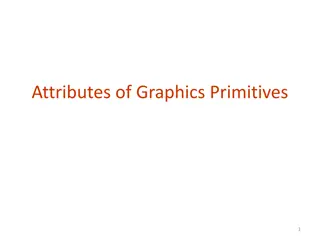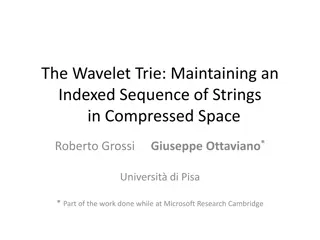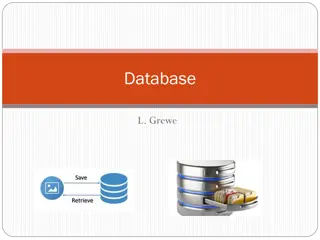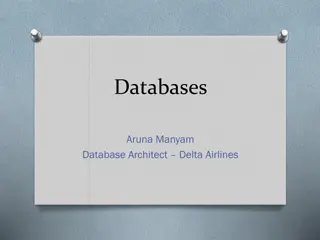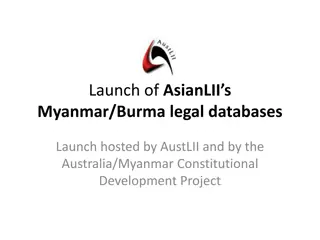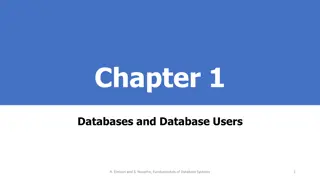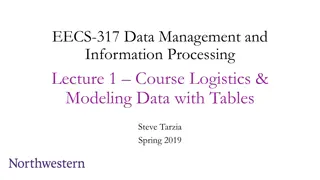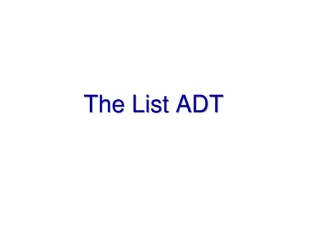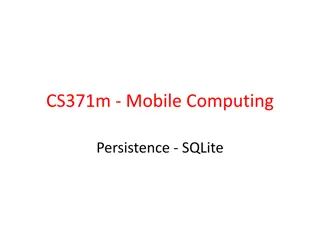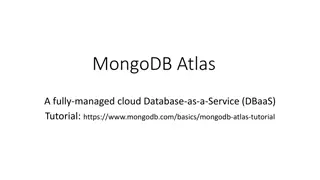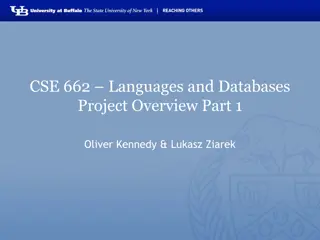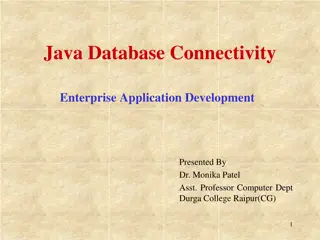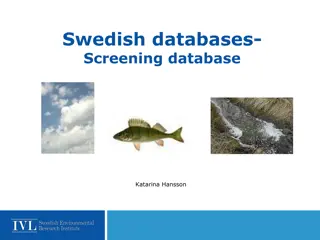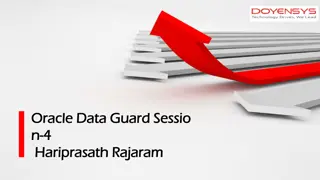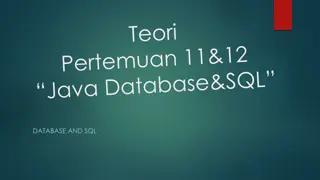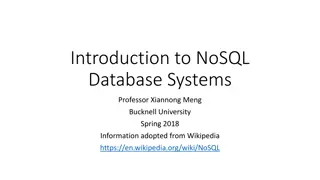Understanding Databases and Database Applications
Databases are collections of related data used to store known facts with implicit meanings in a structured manner. A Database Management System (DBMS) is crucial in managing databases efficiently by defining structures, loading data, manipulating content, ensuring security, and facilitating data acc
1 views • 15 slides
Introduction to Enterprise Databases for GIS Professionals
Explore the world of enterprise databases through a GIS perspective with a focus on concurrent clients, database administration, creating databases/tables, checking service names, unique features, numeric data types, data type parameters in ArcGIS, and character data types. Gain insights into managi
0 views • 52 slides
Understanding File Allocation Strategies in Operating Systems
Explore various file allocation schemes like extent-based systems, linked allocation, file allocation table (FAT), indexed allocation, and combined schemes used in operating systems. Learn about their pros and cons, including details on maximum file size calculations based on disk block sizes and po
0 views • 20 slides
Operating System: File Allocation Methods
File allocation methods in operating systems determine how files are stored in disk blocks. The main methods include Contiguous Allocation, Linked Allocation, and Indexed Allocation. Contiguous Allocation involves allocating blocks in a contiguous manner for efficient disk space utilization and fast
0 views • 14 slides
Mastering Boolean Searching for Efficient Information Retrieval
Explore the power of Boolean searching techniques to streamline your research process. Learn the differences between indexed and full-text databases, grasp the nuances of Boolean operators, and uncover tips for refining your search queries effectively. Dive into the world of synonymy and ambiguity m
0 views • 34 slides
Exploring the World of Bioinformatics Databases
Bioinformatics databases are essential tools in handling molecular biological data, classified into sequence and structure databases. Primary databases store raw data, while secondary databases contain curated information for research. Examples include GenBank, Protein Data Bank, and SWISS-Prot.
1 views • 38 slides
Database Design Principles and Management Overview
This document presents an overview of database design principles, including structured, semi-structured, and unstructured data types. It delves into the role of Database Management Systems (DBMS) in defining, constructing, manipulating, and sharing databases effectively. It also covers various types
0 views • 47 slides
Understanding Addressing Modes in Computer System Architecture
Addressing modes determine how the operand in an instruction is specified, impacting the interpretation and execution. Implied, stack, immediate, direct, indirect, register direct, register indirect, relative, indexed, base register, auto-increment, and auto-decrement are various addressing modes ex
0 views • 4 slides
An Overview of Biological Databases in Bioinformatics
Biological databases play a crucial role in bioinformatics, storing vast amounts of data related to nucleotide sequences, protein sequences, and more. These databases are publicly accessible and essential for research in biological fields. Primary databases, such as GenBank, EMBL, and DDBJ, contain
0 views • 13 slides
Drug Product Distribution Procedures and Records
Written procedures and distribution records are crucial for the efficient distribution of drug products. Procedures should prioritize the distribution of the oldest approved stock first and enable easy recall if necessary. Distribution records must be maintained and indexed for accountability. Diffe
0 views • 10 slides
Understanding Tuples and Dictionaries in Computing Sequences
Tuples are immutable data structures similar to lists, written with round brackets. They can contain different types of elements, be sliced and indexed similarly to lists, concatenated, repeated, nested, and passed by value to functions. Examples show how tuples operate and differentiate from lists.
1 views • 21 slides
Understanding Data Management and Databases
Explore the concepts of data, information, and knowledge, learn why databases are superior to spreadsheets for data storage, and delve into the organization and functionality of relational databases for decision-making purposes.
0 views • 18 slides
Understanding the Importance of Databases for Research Data Management
Databases play a crucial role in research data management by allowing systematic organization, easy data entry, manipulation, and analysis. They enable storing and accessing data efficiently, ensuring data integrity and security, and facilitating complex queries and associations that are not possibl
0 views • 58 slides
Understanding Relational Databases and File-Based Systems
This chapter delves into the fundamental concepts of databases, comparing them to file-based systems, and highlighting the significance of relational databases in modern integrated AISs. It explores the difference between logical and physical views of databases, introduces key concepts such as DBMS
0 views • 70 slides
Understanding Addressing Modes in 8051 Microcontroller
Addressing modes in the 8051 microcontroller play a crucial role in specifying how data is accessed and operated by instructions. They include register addressing, direct addressing, register indirect addressing, immediate addressing, and indexed addressing modes. Each mode offers unique ways to han
2 views • 20 slides
Center for Studying Disability Policy Compendium: Data Collection Methods
This compendium provides a comprehensive overview of collecting data on people with disabilities, featuring 554 indexed references since 2012. It aims to fill knowledge gaps, serving as an up-to-date and accessible resource released annually. The development process involves obtaining diverse refere
0 views • 11 slides
Understanding White Spaces Databases: An Empirical Study
White spaces in the TV band offer opportunities for unlicensed usage, motivating research on white space detection methods like geolocation spectrum databases and spectrum sensing. This study explores errors in white spaces databases, discussing the challenges and implications for white space device
2 views • 30 slides
Managing Belief Annotations in Databases: A Modal Logic Approach
Explore the concept of belief databases that enable data curation based on modal and default logic in a relational model. The work discusses managing inconsistent views in community databases and presents a motivating application scenario to illustrate the challenges and solutions in handling belief
0 views • 34 slides
Understanding Databases and Search Methods in Legal Research
Dive into the basics of legal search using Fastcase, exploring the concept of databases, integrated vs. non-integrated content, indexed and full-text databases, along with examples and the benefits of natural language searching in legal research. Gain insights on the types of databases, how informat
0 views • 20 slides
Understanding Stored and Inherited Relations in Relational Databases
Explore the concept of Stored and Inherited Relations (SIR) in relational databases, as discussed by Witold Litwin at Dauphine University. Discover how a typical scheme of a stored relation defines a natural SIR, leading to more efficient query formulations and less procedural querying processes. Le
0 views • 27 slides
Understanding Python Dictionaries: Key-Value Mapping
Python dictionaries are key-value mappings where elements are stored as key-value pairs instead of being indexed by numbers like in sequences. Dictionaries allow unique keys and provide efficient ways to create, access, and update key-value pairs in Python programming. Learn how to utilize dictionar
0 views • 10 slides
Emerging Trends in Cloud Databases: Challenges and Opportunities
Cloud databases have revolutionized data management, offering scalability and efficiency. This article explores new techniques in cloud-native databases, challenges faced in cloud DBs, and the architecture of Cloud OLTP and OLAP systems. It delves into the significance of OLTP and OLAP in different
0 views • 25 slides
Understanding Advanced Databases and Online Analytical Processing
Explore the world of data warehousing, advanced databases, OLTP, and OLAP with Dr. Nicholas Gibbins. Learn about traditional processing styles, multidimensional databases, and the dynamic analysis techniques of Online Analytical Processing (OLAP). Understand the importance of asking "what if" questi
0 views • 33 slides
Understanding Arrays in CS1600: A Comprehensive Review
Working with arrays in CS1600 involves essential concepts like declaring arrays, array variables, variable types, and usage of indexed variables. Arrays provide a structured way to store and process collections of data of the same type efficiently. Mastering array basics is crucial for effective pro
0 views • 83 slides
Understanding Attributes and Color Schemes in Graphics
Graphics systems utilize attributes to define how primitives are displayed, such as color and size, while color and grayscale can be stored in different ways like direct storage and indexed storage schemes. The RGB color components play a key role in determining the color shades, with various color
0 views • 51 slides
Efficient Maintenance of Indexed String Sequences in Compressed Space
The Wavelet Trie, Prefix Operations, and Dynamic Sequences are explored in maintaining an indexed sequence of strings efficiently. Various operations like access, rank, select, and dynamic updates are discussed with the aim of storing strings in minimal space while supporting polylog operations effe
0 views • 20 slides
Understanding Database Management Systems and Data Storage
Explore the world of Database Management Systems (DBMS) and learn about the evolution of data storage from flat-file to relational databases. Discover the key features of a DBMS, different database types, administration tools, SQL and NoSQL databases, CAP theory, and considerations for choosing betw
0 views • 32 slides
Understanding Databases and Information Technology in Delta Airlines
Explore the critical role of databases and information technology in Delta Airlines, the second largest airline in revenue globally. From data storage to operational efficiency, learn how IT powers various functions such as flight operations, customer service, revenue management, and more, ensuring
0 views • 25 slides
Launch of AsianLIIs Myanmar/Burma Legal Databases by AustLII
The launch of the AsianLIIs Myanmar/Burma legal databases hosted by AustLII and the Australia/Myanmar Constitutional Development Project aims to provide a valuable tool for researchers, improve access to legal information in Myanmar, and support priority projects. The databases offer resources for s
0 views • 4 slides
Overview of Databases and Recent Developments in Database Systems
Explore the fundamentals of databases, including types, applications, users, and advantages. Learn about traditional and recent database applications, such as social networks, search engines, and emerging technologies like Big Data systems and NOSQL. Understand the concept of databases as a collecti
0 views • 30 slides
Handling Complex Data with SQL Databases: A Powerful Foundation for Data Science
Learn how to manage real-world, complex data efficiently using SQL relational databases. Explore the limitations of Excel and Matlab in modeling data relationships and data integrity enforcement. Understand the importance of keeping data and analysis separate. Delve into examples of data sets beyond
0 views • 34 slides
Understanding Abstract Data Types: Lists Exploration
Explore the concept of list abstract data types, different classes of lists, and various list implementations including ordered, unordered, and indexed lists. Understand how elements are organized in ordered lists based on characteristics, how unordered lists allow flexibility in element placement,
0 views • 41 slides
Introduction to Relational Databases and SQLite for Mobile Computing
Covering the basics of relational databases, SQL, and SQLite, this content provides an overview of database management systems, their history, and the key concepts related to data storage and retrieval. It also touches on the practical aspects of working with SQLite in Android applications, outlinin
0 views • 61 slides
MongoDB Atlas Overview and Tutorial
MongoDB Atlas is a fully-managed cloud Database-as-a-Service offering by MongoDB. This tutorial provides a step-by-step guide on how to set up a free MongoDB Atlas account, create databases and collections, add database users, and explore and manipulate your data using MongoDB Compass. The tutorial
0 views • 34 slides
Database Benchmarking: Embedded Databases Comparison
This project involves benchmarking lightweight embedded databases like SQLite, BerkeleyDB, and others. Students will evaluate and compare these databases using specific workloads to analyze their performance. The outcomes include a detailed report on each system's strengths and weaknesses. Required
0 views • 19 slides
Introduction to Java Database Connectivity (JDBC) in Enterprise Application Development
JDBC, or Java Database Connectivity, is a vital technology in enterprise application development that provides a standardized library for Java programs to connect to databases via SQL commands. It abstracts vendor-specific details, making connectivity to multiple databases seamless. JDBC API standar
0 views • 13 slides
Environmental Monitoring and Screening Databases in Sweden
This content delves into the monitoring and screening databases managed by Katarina Hansson at IVL, focusing on chemicals, emissions, and national environmental data in Sweden. It covers the use of national databases, biota databases for pollutants in biological samples, and screening studies involv
0 views • 10 slides
Oracle Data Guard: Training Objectives and Far Sync Instances
This content highlights training objectives for Oracle Data Guard, focusing on the new features such as Far Sync Instances and Active Standby Databases. It covers configuring Data Guard Broker, plugging Pluggable Databases, recovering Standby Databases, and achieving a highly available Oracle Databa
0 views • 25 slides
Understanding Databases and SQL: A Comprehensive Overview
Databases are fundamental in computer-based record-keeping systems, essential for organizations to maintain and access crucial information efficiently. This comprehensive guide covers the significance of databases, advantages of centralized databases, database models, relational databases, and more.
0 views • 52 slides
Understanding NoSQL Databases in Modern Data Management
NoSQL databases offer innovative storage and retrieval mechanisms for diverse data types, deviating from traditional relational databases. This article explores the history, definition, advantages, challenges, and types of NoSQL databases, shedding light on their pivotal role in current data managem
0 views • 11 slides
